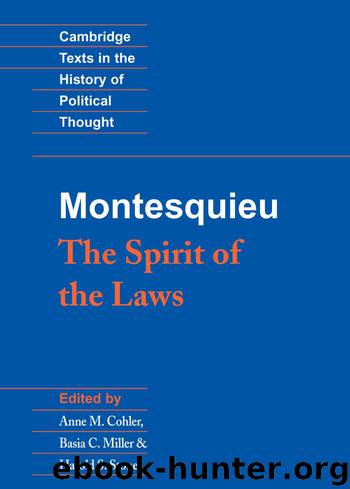Montesquieu: The Spirit of the Laws (Cambridge Texts in the History of Political Thought) by Charles de Montesquieu

Author:Charles de Montesquieu [Montesquieu, Charles de]
Language: eng
Format: epub, azw3
Publisher: Cambridge University Press
Published: 1989-09-21T00:00:00+00:00
* * *
CHAPTER 21
The discovery of two new worlds: the state of Europe in this regard
The compass opened the universe, so to speak. Discovery was made of Asia and Africa of which only some coasts had been known, and of America, which had been completely unknown.
The Portuguese, sailing the Atlantic Ocean, discovered the southern tip of Africa; they saw a vast sea; it carried them to the East Indies. Their perils on this sea and the discovery of Mozambique, Melinde, and Calicut were sung by de Camoens,n in whose poetry one feels something of the charms of the Odyssey and the magnificence of the Aeneid.
Until then the Venetians had engaged in commerce with the Indies through the countries of the Turks and had pursued it in the midst of insults and outrages. By the discovery of the Cape of Good Hope and by other discoveries made soon after, Italy was no longer at the center of the commercial world; it was in a corner of the universe, so to speak, and it remains there today. As the commerce of the Levant itself depends today on that done by the great nations in the two Indies, Italy engages in it now only in a secondary way.
The Portuguese dealt in the Indies as conquerors; the laws143 hampering commerce that the Dutch impose at present on the commerce of the petty Indian princes were established by the Portuguese before them.
The House of Austria had a prodigious fortune. Charles inherited Burgundy together with Castile and Aragon; he succeeded to an empire; and, in order to procure for him a new kind of greatness, the universe expanded and a new world obedient to him appeared.
Christopher Columbus discovered America, and, though Spain sent no more forces there than a minor European prince could have sent, it brought into subjection two great empires and other great states.
While the Spanish were discovering and conquering in the west, the Portuguese were extending their conquests and discoveries to the east: these two nations met; they had recourse to Pope Alexander VI, who made the famous line of demarcation and thus gave judgment on a great lawsuit.
But the other nations of Europe did not let them enjoy this division in quiet; the Dutch drove the Portuguese out of much of the East Indies, and various nations set up establishments in America.
At first, the Spanish considered the newly discovered lands as objects of conquest; peoples more refined than they saw them as objects of commerce and as such directed their attention to them. Many peoples acted so wisely that they granted empire to trading companies who, governing these distant states only for trade, made a great secondary power without encumbering the principal state.
The colonies formed there are in a kind of dependence of which there are very few examples among the ancient colonies, because those of today belong either to the state itself or to some commercial company established in that state.
The purpose of these colonies is to engage in commerce under better conditions than one has with neighboring peoples with whom all advantages are reciprocal.
Download
Montesquieu: The Spirit of the Laws (Cambridge Texts in the History of Political Thought) by Charles de Montesquieu.azw3
This site does not store any files on its server. We only index and link to content provided by other sites. Please contact the content providers to delete copyright contents if any and email us, we'll remove relevant links or contents immediately.
The Secret History by Donna Tartt(19088)
The Social Justice Warrior Handbook by Lisa De Pasquale(12190)
Thirteen Reasons Why by Jay Asher(8910)
This Is How You Lose Her by Junot Diaz(6887)
Weapons of Math Destruction by Cathy O'Neil(6280)
Zero to One by Peter Thiel(5802)
Beartown by Fredrik Backman(5754)
The Myth of the Strong Leader by Archie Brown(5507)
The Fire Next Time by James Baldwin(5446)
How Democracies Die by Steven Levitsky & Daniel Ziblatt(5218)
Promise Me, Dad by Joe Biden(5153)
Stone's Rules by Roger Stone(5088)
A Higher Loyalty: Truth, Lies, and Leadership by James Comey(4964)
100 Deadly Skills by Clint Emerson(4925)
Rise and Kill First by Ronen Bergman(4789)
Secrecy World by Jake Bernstein(4753)
The David Icke Guide to the Global Conspiracy (and how to end it) by David Icke(4720)
The Farm by Tom Rob Smith(4511)
The Doomsday Machine by Daniel Ellsberg(4490)
